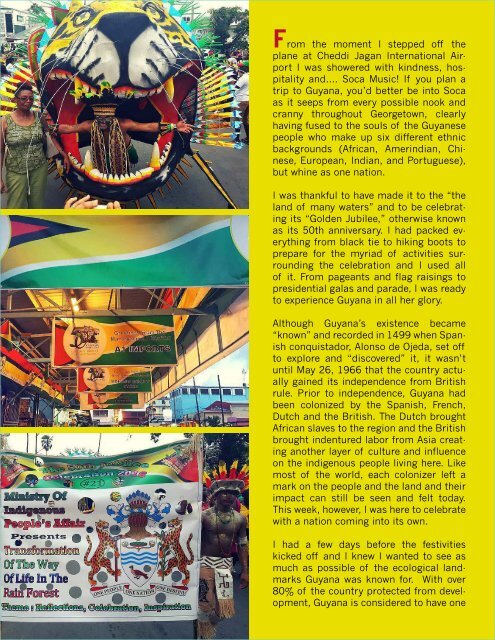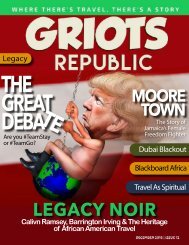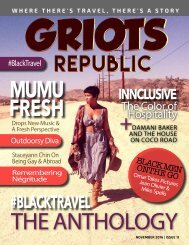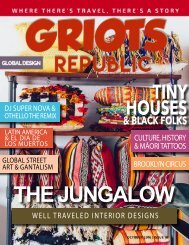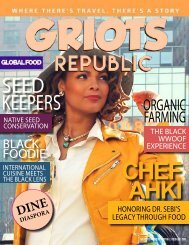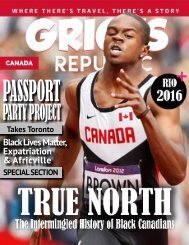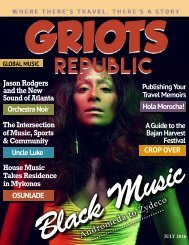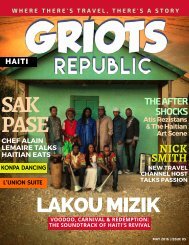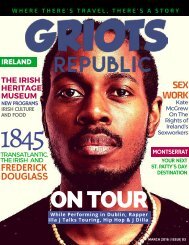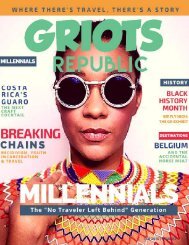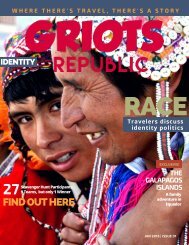GRIOTS REPUBLIC - An Urban Black Travel Magazine - June 2016
ISSUE #6: DESTINATIONS TRAVELER PROFILES: Sonjia Mackey, Shenita Outland, Deidre Mathis & Alonzo Cartlidge
ISSUE #6: DESTINATIONS
TRAVELER PROFILES: Sonjia Mackey, Shenita Outland, Deidre Mathis & Alonzo Cartlidge
Create successful ePaper yourself
Turn your PDF publications into a flip-book with our unique Google optimized e-Paper software.
From the moment I stepped off the<br />
plane at Cheddi Jagan International Airport<br />
I was showered with kindness, hospitality<br />
and…. Soca Music! If you plan a<br />
trip to Guyana, you’d better be into Soca<br />
as it seeps from every possible nook and<br />
cranny throughout Georgetown, clearly<br />
having fused to the souls of the Guyanese<br />
people who make up six different ethnic<br />
backgrounds (African, Amerindian, Chinese,<br />
European, Indian, and Portuguese),<br />
but whine as one nation.<br />
I was thankful to have made it to the “the<br />
land of many waters” and to be celebrating<br />
its “Golden Jubilee,” otherwise known<br />
as its 50th anniversary. I had packed everything<br />
from black tie to hiking boots to<br />
prepare for the myriad of activities surrounding<br />
the celebration and I used all<br />
of it. From pageants and flag raisings to<br />
presidential galas and parade, I was ready<br />
to experience Guyana in all her glory.<br />
Although Guyana’s existence became<br />
“known” and recorded in 1499 when Spanish<br />
conquistador, Alonso de Ojeda, set off<br />
to explore and “discovered” it, it wasn’t<br />
until May 26, 1966 that the country actually<br />
gained its independence from British<br />
rule. Prior to independence, Guyana had<br />
been colonized by the Spanish, French,<br />
Dutch and the British. The Dutch brought<br />
African slaves to the region and the British<br />
brought indentured labor from Asia creating<br />
another layer of culture and influence<br />
on the indigenous people living here. Like<br />
most of the world, each colonizer left a<br />
mark on the people and the land and their<br />
impact can still be seen and felt today.<br />
This week, however, I was here to celebrate<br />
with a nation coming into its own.<br />
I had a few days before the festivities<br />
kicked off and I knew I wanted to see as<br />
much as possible of the ecological landmarks<br />
Guyana was known for. With over<br />
80% of the country protected from development,<br />
Guyana is considered to have one


